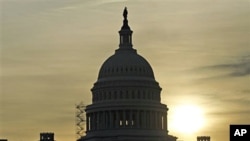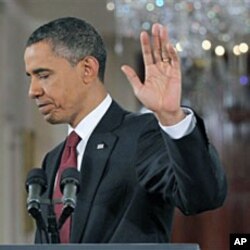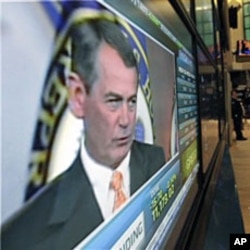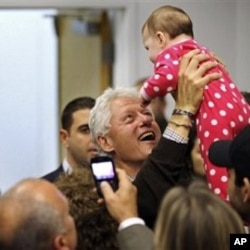Two years after promising to bring change to Washington, Democratic President Barack Obama faces the new political reality of Republicans promising change of their own after winning back control of the House of Representatives. Republicans say Tuesday's congressional midterm elections were a rebuke of the president and his policies. Mr. Obama says it is a call from the American public for bipartisan governance.
Republicans easily retook the House, but they fell short of winning back the Senate. It was a remarkable comeback for a political party declared irrelevant by some Democrats only two years ago in the wake of Barack Obama's presidential victory and expanded Democratic Party majorities in the House and the Senate.
The president acknowledged the public mood in his first news conference since Tuesday's elections. He said he is committed to finding areas of cooperation with the new Republican Party majority in the House.
"No one party will be able to dictate where we go from here, and that we must find common ground in order to make progress on some uncommonly difficult challenges," the president said. "And I told [Ohio Republican Representative] John Boehner and [Kentucky Republican Senator] Mitch McConnell last night that I am very eager to sit down with members of both parties and figure out how we can move forward together."
Although they narrowly missed gaining enough seats to win a majority in the Senate, Republicans are emboldened by Tuesday's gains overall and they eager to reduce the size of government, cut federal spending and lower taxes.
Ohio Republican Representative John Boehner is expected to become the next Speaker of the House. He told reporters that cooperation will depend on the willingness of the president and his fellow Democrats to change.
"It is pretty clear that the Obama-[California Democratic Representative Nancy] Pelosi agenda is being rejected by the American people. As I said last night, they want the president to change course. And I think it is change course we will," said Boehner.
Voter exit surveys from Tuesday's elections show that Americans are worried about the economy more than any other issue, and that they are frustrated by the high unemployment rate -- which is 9.6 percent nationally.
But pollster John Zogby says the results should be read as a rejection of the Democrats more than an embrace of the Republicans.
"Frustration with the Democrats spelled victory for Republicans, but not love," he said.
Republicans say that the elections show that most Americans agree with their diagnosis that the Obama administration has spent too much money and run up the national debt too high.
But pollster Zogby says most people were focused on a more basic concern.
"Solid majorities say we will accept trillions of dollars being spent, but where are the jobs? And where is the progress? And so essentially, that is wherein a lot of the anger comes," Zogby said.
The key question is: What happens next? Will the president and Republicans be able to find common ground on issues like the economy, foreign trade and climate change?
Many political analysts are skeptical, at least for now, including John Fortier of the Washington-based American Enterprise Institute.
"Two parties, very polarized, and that will drive what we will see after the election, which I expect will be a significant amount of gridlock," he said.
Several incoming Republican lawmakers were strongly supported by grassroots conservative and libertarian activists from the Tea Party movement, which has made shrinking the size of government its top priority.
University of Virginia political expert Larry Sabato says he sees a showdown coming because many of the elected Tea Party supporters already have signaled that they are more interested in principle than compromise.
"I have seen many of the Tea Party leaders say, 'Our people are going to Washington to change things; we are not going to compromise and the others are going to have to come along with us,' said Sabato."
Another complicating factor that might make bipartisan cooperation difficult is the 2012 presidential election. Although still two years away, potential Republican White House contenders are already making preparations for a presidential run that will likely begin in earnest early next year when candidates start raising money and recruiting supporters.
Again, political analyst John Fortier:
"You will see presidential candidates on the Republican side announcing that they are running for president, and that will be another dynamic, which is likely to pull the parties apart as the presidential candidates on the Republican side argue amongst themselves, probably appeal to a more conservative primary electorate, and are less likely to be voicing interest in cooperation with the president," Sabato added.
Former Democratic President Bill Clinton faced a similar challenge following the 1994 midterm elections when Republicans were swept to power in the House and Senate. Mr. Clinton confronted the Republicans on some issues and cooperated with them on others - a pattern, analysts say, that contributed to his reelection in 1996.



